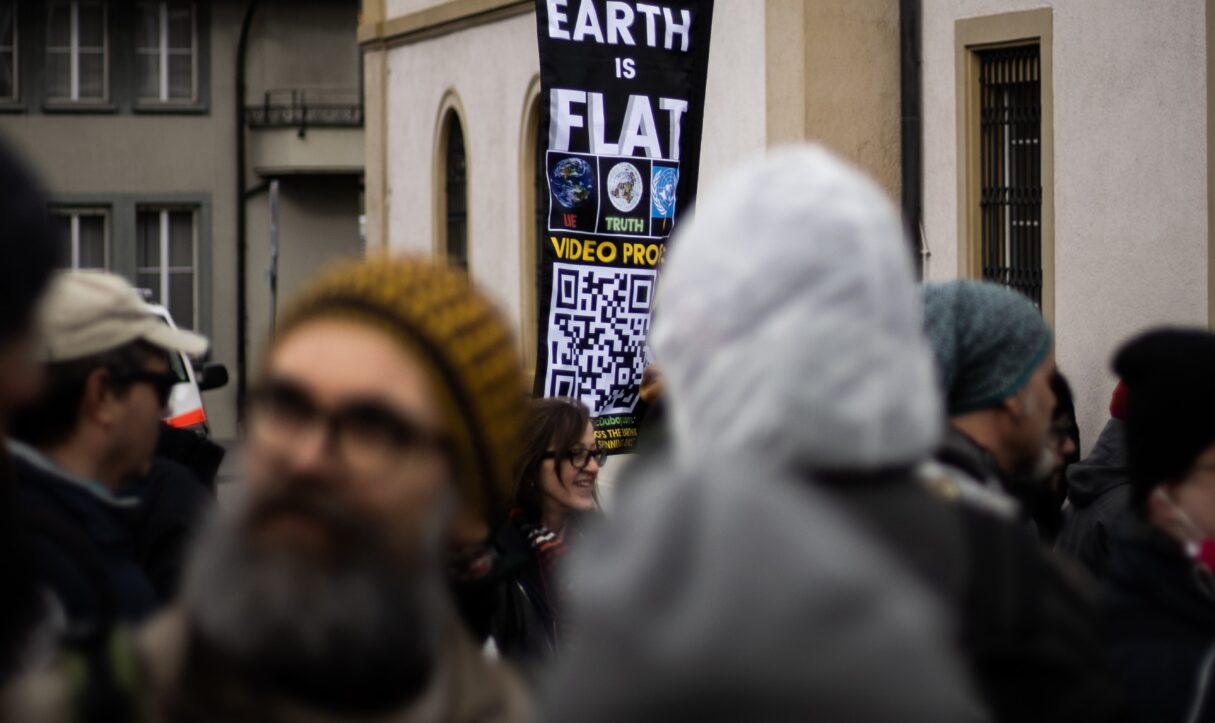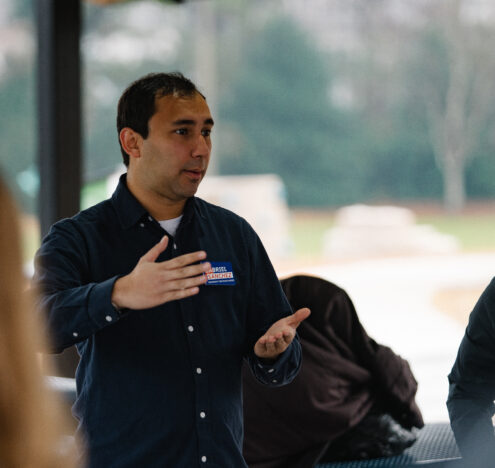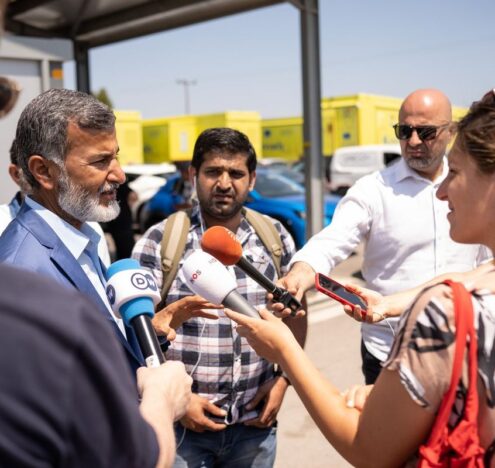When we’re not in a crisis, food doesn’t tend to make it into stump speeches or budget pressers. It’s easy to end up in front of the computer, scrolling social media, snacking on something produced a thousand miles away and not think twice about it.
But what we eat touches every aspect of our society — from security to culture, labor, economy, climate and more. It’s also a potent lightning rod for online conspiracies and disinformation.
Listen and subscribe now on Apple Podcasts, Stitcher, Spotify, Pocket Casts, or wherever you get your podcasts to receive a new episode every two weeks.
Guests: Katie (pseudonym); Nina Jankowicz, Centre for Information Resilience; Domini Mellott, Secret Harvest; Vidya Mani, University of Virginia
Additional Resources:
Russia Smuggling Ukraninan Grain To Help Pay For Putin’s War, Michael Biesecker, Sarah El Deeb, and Beatrice Dupuy, The Associated Press
Food Supply and Covid-19: Breaking the Chain, Vidya Mani
Russian Disinformation in Africa: What’s sticking and what’s not, Mary Blankenship and Aloysius Uche Ordu, Brookings
Food Should Be Treated As National Security, Ehud Eiran, Michaela Elias and Aron M. Troen, Foreign Policy
Transcript:
LAICIE: I’m Laicie Heeley, and this is Things That Go Boom.
I realized the other day… I can’t remember the last time I really sat down to eat a meal.
I mean, I sit.
But with four kids around the table someone always needs a drink, or a fork, or the green plate instead of the blue plate and pretty soon… the meal is over.
I’m pretty sure I used to sit to eat.
But these days, more often than not, I find myself snacking on the run, shoving whatever bits and bobs I can muster up into my face… usually while I scramble back to work in front of my computer.
And then there’s the late-night snacking, when I should be in bed, but, instead… I’m scrolling social media…
That is how I ended up on the phone with Katie.
That’s not her real name. She asked for anonymity for privacy reasons.
Katie and I have been Facebook friends for years. We have the kind of online connection where you don’t remember how you met — but through sheer internet inertia, keep tabs on each other. Weddings, babies, graduations…and in Katie’s case? Her thoughts on the end of the world.
KATIE: When you know their plan, everything doesn’t seem so crazy. It’s like, well, it actually makes sense.
LAICIE: Katie spends a lot of time thinking about them.
KATIE: I follow David Icke. He’s been studying this for 32 years, and I’m very skeptical, so everything he says, I research it … but he’s been right about everything so far.
Who they are, according to him — and I agree with this — is a Satanic cult that have begun taking over every government on the planet.
LAICIE: Even outside government — she thinks those with the most power and money in our world made a deal with the literal devil for it.
KATIE: Zuckerberg never created Facebook, Gates was never a poor little pauper in his mother’s basement creating Microsoft. They were given that because they’re part of the cult.
[FADE UNDER]
LAICIE: Katie’s been watching Icke’s content for at least a decade — and lately, other personalities, like Alex Jones. She’s preparing for the worst.
KATIE: They’re doing exactly what, you know, the people have studied this have said they were gonna do. Which is completely destroy the economy, destroy food sources, and then make us beg for their new system.
LAICIE: I’ve witnessed Katie’s anxiety grow…especially since 2020. And lately she’s been posting more about one particular concern — that our food system is being sabotaged.
KATIE: Warehouses throughout the globe are just randomly hit by airplanes, set on fire — and they’re all food sources. It’s not, you know, toilet paper makers, it’s not toy makers. It’s food warehouses.
I saw a video of a woman who was transporting baby formula, and they told her to kind of drive into a really remote and graveled area — and she took a video of them just taking pallets of baby food and just piling it into a pile on this graveled area, kind of in an obscure area.
So they are systematically trying to make it so that we can’t get food. Why? Well, because as I told you before, Henry Kissinger said, ‘Whoever controls food, controls the world.’
LAICIE: She’s taken matters into her own hands. Now the family has backyard chickens…
KATIE: — because I wanna make sure that my family has food —
LAICIE: And she buys only organic food…
KATIE: — cause I’ve studied pesticides, which by the way, that’s part of all of this too —
LAICIE: Because ultimately, Katie doesn’t trust our leaders. She’s scared. For herself and the people she loves. Things feel so unstable these days. It weighs on her.
KATIE: It’s very difficult. I think the hardest thing is, you know, my children — I wanna make sure my children are okay. I don’t want what I’m hearing is gonna happen to be their life — to be their world … and so for me, fighting it every day is a good distraction.
I have always fought for what’s right. And it is not easy, but I just can’t live with myself if I don’t. And this is the biggest fight of my life.
LAICIE: The fight that Katie’s talking about is posting links on Facebook and talking friends and family. She warns them to prep with food and supplies. She forages dandelion greens to eat.
KATIE: What I am afraid is going to happen is that it’s gonna be a progression — like, right now, prices are high. Poor people are really gonna lose their apartments in their homes ‘cause they can’t afford the food and the gas and the apartments.
[FADE UNDER]
LAICIE: Katie eventually tells me why she believes these things. It’s a gut feeling. This story is too fantastic for a guy like David Icke to have made up. It just explains too much.
KATIE: These people’s lives are destroyed by coming out with this. That’s a good indication it’s probably true.
LAICIE: At their core, these ideas aren’t new. As long as there’s been an internet — and even before — there’s been people like Katie and David Icke and Alex Jones talking about the New World Order.
[INTRO MUSIC CUE]
It’s a worldview I don’t share — that’s widely accepted as untrue and harmful on several fronts. And yet, after we parted ways, there was something about our conversation I couldn’t shake.
It wasn’t about what Katie told me. The details didn’t really matter. But it just felt like there was more to the story.
I couldn’t help myself…so, I dove in.
AD BREAK
LAICIE: Katie already knows who you think she is.
[MUSIC CUE]
Maybe you’ve already pictured the red hat and Q-Anon shirt. But…if your mind was going there, you, like me, missed something.
KATIE: I’m liberal, I’m a Democrat. I’m not religious — I am very, very spiritual —
LAICIE: She gets that a lot. Especially when trying to convert people.
KATIE: Sadly, I’ve had the hardest time with my liberal friends, although really all but one have come around. But it was hard, because they thought, ‘Well, this is a Trump thing. This is a Q-Anon thing, this is a crazy thing, this is a Christian thing. It is not. You cannot be president of the most powerful country on this planet without bowing down to this cult. They won’t allow it — ask John F. Kennedy!’
LAICIE: Katie says the content she follows doesn’t come from any one partisan source – instead, she’s accessing a virtual salad bar of accounts pushing similar conspiracies… but you don’t have to go to the dark corners of the web to hear the same.
Sometimes, all you have to do is turn on the TV.
TUCKER CARLSON: So just moments before we went to air tonight, a plane apparently crashed into a General Mills plant, a food plant in Covington Georgia…
RADIO HOST: “It’s obviously suspicious and it could lead to serious food shortages…”
BOB UANUE (GOYA CEO): At the core of inflation — and it is out of control, especially in food — is evil. Our desire to control us…”
[MUSIC]
LAICIE: Before we go forward, I have to say it. The deceit and harm of conspiracies frustrates me. At the same time, I hate when people mock believers.
So many jokes just peddle stereotypes or dismiss their questions entirely. And, sure — that’s really easy to do. It’s easier than facing the fact that in 2022, conspiracies have their own supply chain. The more important question is why does it feel like people are buying now more than ever?
NINA: I think they’ve always been there to some extent, but I would say that they really started gaining traction in the United States in 2017, 2018, like more substantively when we saw kind of like, Pizzagate, when we saw Q-Anon really gaining traction, being shared by members of Congress and on and on and on.
[FADE UNDER]
LAICIE: That’s Nina Jankowicz. She’s Vice President at the UK-based Center for Information Resilience. And she’s seen how validating conspiracies can be during difficult moments.
NINA: Like, ‘Why do I feel like I can’t get ahead in life? Why am I having trouble keeping my family’s financials afloat? Why can’t I find baby food in the supermarket?’ All of these things. And there’s an explanation — often both simpler and more convoluted at the same time than what reality is.
LAICIE: And when we see broader crises…say — I don’t know — a multi-year pandemic, followed by global proxy war with a side of climate disaster —
NINA: Those tend to kind of hook into these conspiracy theories as well. And so with the confluence of a really uncertain time in our world — as well as people being majorly, majorly online — I think that’s what’s brought a lot of them to the forefront.
LAICIE: But as they’ve risen to the forefront, so have the consequences: harassment, threats, physical violence. And, of course, threats to our democracy itself.
NEWS CLIPS: Representatives from Facebook, Twitter, and Google are back on Capitol Hill for a second day of testimony about Russia’s interference in the 2016 election —
And it’s not just Russia — intelligence officials fear China, Iran, and other countries could target the 2020 election…
LAICIE: In 2016, Nina was in Ukraine on a Fulbright fellowship, working for its Ministry of Foreign Affairs. She found herself up close and personal with Russia’s growing online army of trolls and bots.
NINA: And I remember very early on, my colleagues in the ministry and across Ukrainian government being like, ‘Why aren’t you guys doing more? What’s going on over there that, that you’re so slow to act? Don’t you see that we’re fighting a war, that, you know, countries like Estonia and Georgia have been dealing with this threat for years? And you seem to be walking around with your hands over your ears?’ And I was like, ‘I know, I know.’
LAICIE: The U.S. — and its social media giants — were on their back feet. Which still feels still true today. Attempts to moderate conspiracy movements like Q-Anon on Facebook and Twitter have been at best anticlimactic.
NINA: We saw them kind of rebrand and go to a different way of talking about themselves — but they’re definitely still there, even though, you know, Q himself has been a little bit less active.
So, just because it’s been de-platformed in a major way from social media networks doesn’t mean that it is losing it’s effect in the general population. And I would also say that it’s become so entrenched with some of the kind of 2020 election truther theories, and a lot related to COVID disinformation, that it’s kind of difficult to pick apart those narratives at this point. It’s just kind of one giant melting pot of conspiracy theories.
LAICIE: And the pot is filling up. In May, the State Department accused Russia of stirring online conspiracies to deflect its role in distrupting global food chains. See, Ukraine is a major grain supplier to Africa and the Middle East.
The posts that concerned the State Department claimed Western countries were triggering mass hunger by blocking grain shipments, or even flat-out stealing them.
Except, just in early October, the Associated Press revealed that Russia is topping off its own food shipments with stolen Ukrainian corn, barley and wheat. It’s also bombing Ukrainian farms.
It’s using the profits to pay for its war and then flooding social media with content intended to confuse civilians.
NINA: When we have this giant conspiracy melting pot or snowball, what happens is that it’s really difficult for somebody on the receiving end to understand who it is that’s behind what they’re interacting with and why it’s being presented to them. And so, for your average person who doesn’t have a lot of time to do that, they’re either likely to absorb it or likely to completely disengage from not only the information cycle, but from democracy itself … And I think that’s really scary.
LAICIE: Nina says it’s not like Russia and China are just creating fake accounts and buying ads in rubles.
NINA: So you might see fringe media trafficking in this conspiracy, and then often it makes its way to the halls of politics or more mainstream outlets … who then give cover and plausible deniability to malign foreign actors. We saw that in the 2020 election. We probably will see it in 2022 and 2024 because it’s too easy for them and we have to square that circle.
LAICIE: So…what do you do?
NINA: First we have to get our heads out of our asses. I’m not confident that that’s happening anytime soon in the policy sphere.
And let me just say very plainly — because I don’t have a dog in this fight anymore. I think the Democrats underestimate how big a problem this is and the Republicans fully understand to what extent they can manipulate it and use it to their own purposes.
LAICIE: Nina Jankowicz knows a thing or two about ending up on the dark side of the internet.
NEWS CLIP: Nina Jankowicz, the head of the Disinformation Governance Board at the Department of Homeland Security, has resigned … [FADE UNDER]
LAICIE: This past spring, the Biden Administration hired her to lead a new federal project. The goal? Herding cats in America’s biggest security agency.
NINA: There’s a lot of work happening, perhaps under different names, but the idea was to make sure that these component parts as we call them in DHS, would talk to each other and would share best practices and, and, you know, share some of the resources that they had developed and invested in over the years.
LAICIE: They’d tackle everything from tracking disinformation to coordinating a real federal response. It was a pretty run-of-the-mill attempt to wrangle a big unweildly bureaucracy.
And, maybe because the department didn’t see it as such a big deal, the program’s announcement totaled a few forgettable lines in Politico. No big rollout — and no context.
NINA: Then, within hours of that coming out, Jack Posobiec had labeled me a Minister of Truth, and the entire right wing internet was attacking me and the department.
LAICIE: Pandora’s wifi router was open. People claimed the board would censor online speech…that Nina was its “Big Sister”. And within days, she was the talk of Capitol Hill.
NEWS CLIPS: The Biden Regime wants to talk disinformation? Let’s give ‘em something to talk about—
Do they not trust Americans enough, that they want to control that much of our lives?
Why on God’s green earth would you nominate a human geyser of misinformation?
I’m sure Jesus loves her, but everybody else thinks she’s bizarre —
Let me tell you what Miss Jankowicz will do if she gets power. She will devour the real truth like it was a light snack.
LAICIE: The fiasco even made it into the Russian news cycle. Nina was 8 and half months pregnant.
NINA: I kept making the joke that I just should be like walking around in some very ethereal dress, like rubbing my belly under the cherry blossoms. But that did not happen.
And unfortunately, the department and the administration just decided to roll over to those attacks rather than stand up and be transparent about what we intended to do, which was coordinate, again, the work that was happening within the Department of Homeland Security. And that really makes me sad, and I think is emblematic of the federal government’s ability — and in particular this administration’s ability — to counter disinformation on a broader scale. I mean, we’re two years in and this was very basic and anodyne effort, and it couldn’t even get off the ground.
LAICIE: Which brings us to the question of the half-hour: how does the federal government, in fact, get its head out of its ass?
After the break…we find one possible answer in the grocery aisle. You’re listening to Things That Go Boom. I’m Laicie Heeley.
MIDROLL
LAICIE: 12 years ago, Domini Mellott was at a fork in the road.
[MUSIC]
She’d just left a job in the beauty industry and was battling health issues. It seemed like her immune system was failing.
DOMINI: I got really, really sick when I was 22 years old.
LAICIE: She went to the doctor, but things just kept getting worse. Until one day, when she found herself in the hospital – with acute kidney failure.
It turned out Domini was suffering from Hashimoto’s disease — an autoimmune condition that attacks the thyroid. But, even after her diagnosis, she continued to struggle.
DOMINI: And after about a year of, you know, trying different western medical route — I really started to dive deep into healing with food and herbs and things like that.
LAICIE: Health food wasn’t really cool yet where she grew up in rural Montana. But she ended up liking this new way of life so much, she decided to move to California… to work for a pressed juice company.
DOMINI: They opened and it was like a line out the door pretty much instantly —
LAICIE: The shop was selling thousands of bottles a day.
DOMINI: Each bottle contains, you know, three or four pounds of produce. So we’re talking about needing six to eight thousand pounds of fresh produce…daily.
LAICIE: Within a few years, Domini was moving whole shipping containers from around the world to places like the Midwest. Pineapples from Costa Rica. Almonds from Spain.
LAICIE: So if you could describe the, the supply chains that you worked with in three words, what would they be?
DOMINI: Uh…exploitative?
LAICIE: Mmm!
DOMINI: Unpredictable…and…collapsing.
LAICIE: In Southern California, sourcing was simple. Domini was near the coast with a lot of food grown locally.
DOMINI: Then I started doing it in Minneapolis and that started to get a lot more tricky, especially with, you know, the weather and ice storms and everything up there.
LAICIE: But when she moved to Colorado, that’s when her job – as she put it – really started scaring the shit out of her.
DOMINI: Everything is coming from a couple thousand miles away at least. And I just started feeling like, you know, all it would take is one big storm, one big anything to stop these trucks from coming in and feeding us.
You know, there’s monopolies happening at every single level of every commodity that we eat, increasingly — so that’s what started to happen as well, is that the farmers that I’d been working like increasingly, I couldn’t work direct with a farmer.
LAICIE: She realized that just a handful of companies were responsible for transporting huge amounts of food across the world, and the thought haunted her. Domini grew up in a farming town — her dad sprayed pesticides for agriculture’s biggest power players. But if these companies couldn’t deliver food anymore, for any reason, she wondered…what would happen to society?
That’s when she started thinking more about the value of things. Say you go to the store, and hold a lime in your hand… [FADE UP AMBI IN GROCERY]
DOMINI: — the price of a lime is not the price of a lime, the price of a lime is very much based on how many limes exist on planet Earth right now. It’s a commodity.
If we couldn’t swipe a card or exchange cash and we were just exchanging things on a value for value basis, what becomes valuable at that point? And it’s food and water.
I wanted to go live somewhere where there is a local year round supply of food, and fresh, clean water. And where can I do that as an American citizen? And Hawaii is pretty much it.
LAICIE: A few years ago, Domini decided to uproot her life again — this time, for good. She moved to Kauai … which, ironically, still imports around ninety percent of its food. But she’s part of a local movement to take advantage of year-round growing conditions…scale up local agriculture…and someday, live completely off the land.
DOMINI: It’s my entire life. My second year here, I started an agricultural business to get agricultural raw goods directly from the farm and turn them into value added products.
LAICIE: It sounds pretty idyllic, but for a while, her friends and family thought Domini’s reason for the move was kind of nuts. That all changed in 2020.
NEWS CLIP: Tonight, signs that a critical link in America’s food supply chain might be cracking…as the meat processing plants around the country have become COVID-19 hotspots.
LAICIE: The beginning of the pandemic was our food system’s biggest stress test in decades. You couldn’t get away from the story: panicked headlines warned of both food shortages and product with nowhere to go.
Domini doesn’t believe in conspiracies. She saw this disaster for what it was: a logistical nightmare. But hearing her lay out why she moved, I kept thinking about how much her reasons echoed Katie’s concerns.
[FADE UP KATIE UNDER COPY]
KATIE: The government has made it almost impossible to farm and to ranch. You can’t make money …
Monsanto have made it so that you have to buy seeds only from them …
Bill Gates and China have bought up a lot of our farm land and they’re not using it for farming
LAICIE: That’s how we get to one of the toughest problems we face in tackling disinformation. The kernel of truth.
See, most American farmers could tell you these are actually real, major policy issues. They’d probably also say that Washington has floundered on solutions for decades. Here’s Nina.
NINA: We can’t fix the disinformation crisis until we fix our governance crisis — and I think people feel a real disconnect between themselves and their elected representatives. And that’s for a lot of reasons, including, you know, the death of local news, for one — but it’s also because our elected representatives, by and large, are not really delivering for people on either side of the political spectrum.
LAICIE: These little bits of truth can attach to conspiracies…making them extra sticky.
NINA: Something that appeals to people, that makes them vulnerable to conspiracies and disinformation in the first place. We can’t fact check that out of people. And in fact, there’s a lot of psychological studies dating back to the seventies that shows that when you fact check something, people are actually more likely to remember the untrue version than the true version.
LAICIE: So they hang around in the discourse — an opportunity for the bad guys, and a distraction for just about everyone. Which makes it easier for us to forget how fragile our food system can be.
VIDYA: So most supply chains today, for most part, have been optimized on efficiency and cost. Because that would help you to get things to you at the lowest price at the fastest time possible.
LAICIE: That’s Vidya Mani — a professor at the University of Virginia.
VIDYA: And tell me some one person who does not like that. But they are not optimized for disruption. Very few are.
LAICIE: That said, even she was shocked in 2020, when thousands of U.S. meatpacking workers caught COVID…and one of our biggest food sectors was suddenly flying by the seat of its pants.
VIDYA: The meat packing plant is a great example. We have meat packing concentrated across four or five different companies … large plants run extremely efficiently —
so that if you actually look at the food price over the years, it’s gone down. It’s made food affordable because we have these efficiencies and optimality in the supply chain. But when Covid hit and one of them went down — 30% of the meatpacking was out.
LAICIE: Here’s what efficiency looks like in meatpacking: workers packed shoulder to shoulder, often in poor ventilation, processing over a thousand head of livestock per hour.
You can imagine why thousands fell sick in a matter of weeks. What’s less clear is why it took massive closures for companies to respond with public health measures, like masking or sick leave.
VIDYA: So if you think of something as a critical service, as a critical infrastructure, then it should also be flexible and robust and resilient. All these come as afterthoughts to us — not while we are designing a supply chain.
So think of driving on an interstate. [SFX road driving noise] A crash happens [SCREECH AND COLLISON NOISE].
Three lanes out of four are closed. That’s expected. What makes a difference is how fast does the emergency response team get there? How fast they clear the wreckage, how fast they get the people to triage and clear up the rest of the lanes for it to get moving. You have a bad system where the ER force is a hundred miles out? You’re sitting there for a day. You get response team there in an hour, which is the same thing for supply chain — you get a backup, you get facilities, you get alternate routes — you see the pain as much less, you start moving forward lot quicker. So breakdown is inevitable. Recovery does not need to take so long if you’re prepared.
LAICIE: In that sense — she’s less surprised by the proliferation of food conspiracies.
VIDYA: I think it’s easier to opine when you are looking at it from a systems point of view and you are sitting with your belly full and you do not have to worry about where your next meal is coming from or how much it’s gonna cost.
LAICIE: … this take, of course, isn’t the only explanation for the growth of American conspiracy culture. But, it is one we often forget.
VIDYA: If you are living paycheck to paycheck and most of your budget is on food, and you see prices go up 60, 70 percent — such that you are gonna have to choose between buying eggs or yogurt, eggs or milk. There is going to be a feeling that in the 21st century, this should not be happening.
LAICIE: 2020 was a tale as old as time: Decreased supply plus skyrocketing demand equaled chaos at the grocery store. But what came after was far more novel.
VIDYA: Talk to the food industry people — they wouldn’t say that 2020 was scary. Initially, yes, when the first pandemic hit, it was. But after that, they managed. It’s when everything started opening up, they just couldn’t keep up and they’re still not able to keep up. Even today.
We think of 2020 as the pivotal year for us in terms of the pandemic. But our supply chains, especially our supply bases, think of where coffee’s grown. Think of where sugar is grown. Think of where we get our chips, right? Where are they made? Those countries went through faces of pandemic and lockdown at different points in time.
LAICIE: Unpreparedness can be logistical — say, not getting food onto shelves. But these days, Vidya worries more about the economic impacts of chronic supply issues.
VIDYA: If you had known your chain, you could have prepared, you did not need a pandemic to do that.
When you talk about a nuclear strike, right? A nuclear strike, a hurricane, anything like that, we have FEMA, we have others who are working. So that’s the emergency storage that starts coming in. So we are prepared with that. What we are not prepared is this inflation kind of creep that’s happening — because it’s so slow.
There was no major stoppage or shortage — it just keeps, every day things go up by 5 cents by 10 cents, right? And every day that minuscule percentage — but it adds upp very quickly — a population finds it unaffordable. When that gets over a tipping point, that’s when I think civil society is at risk. And it’s not something we are prepared for. It’s not something we recognize or see.
LAICIE: Many experts believe that some increases — like in meat and dairy — are actually just price gouging by companies that control most of the American supply. America’s “Big Four” packers — who’ve consolidated between 54 and 85 percent of U.S. meat — have brought in record profits since the pandemic began.
And a lack of oversight of that price gouging? Well… that just makes the problem worse. The food problem. And the conspiracy problem.
I asked Nina Jankowicz — how do you build faith in such a basic aspect of life when, like in the food sector, the primary goal of most of the media we consume is not public service, but profit?
NINA: I think a lot of the work needs to be in civil society toward information literacy and the sorts of campaigns that uncover the bad stuff that’s happening online.
I think we need to see a lot more of a concerted effort. In the countries that have dealt with this well, it’s not just the government working on it, right? The government is funding programs in civil society to educate people. They are making sure there is nonpartisan, state funded media that people can rely on in a time of crisis. And in some cases, they’re bringing the tech companies to heel with regulation that, provides oversight and again, doesn’t censor, but just make sure that the enormous plane, that is being flown by somebody who tried to just make a site to rate hot girls is subject to some amount of scrutiny behind closed doors.
LAICIE: Nina says America could use a federal commission on the internet — aimed at setting guidelines and accountability — as is the case with nearly every industry in our country.
NINA: But we’re pretty behind on that. And so the UK has the Office of Communications that’s gonna oversee some of the elements of their online safety bill. Australia has an e-safety commissioner, which is doing things in terms of transparency. Very interestingly, they’re asking the social media companies a bunch of questions, and if the social media companies don’t answer those questions about content moderation and other things, they get fined a pretty significant amount of money. And those questions — the answers to the questions are made public.
I think that’s really interesting. And it doesn’t involve any content being removed from the internet, right? It’s not about censorship, it’s about pulling back that curtain and kind of engendering some transparency online.
LAICIE: Information, as it turns out, is something we do have the right to demand. Just like we have the right to demand better food.
VIDYA: We are perfectly right in asking that the supply chain should work for us. We are owed that what we buy has been responsibly sourced, and will be there at the expected price, and in the expected timeframe that we want. But we also have a duty to push for it and to ask and to know and to what we do with the next stage of it. So if we are not willing to reward the right behavior, then why will there be the right behavior?
LAICIE: Food is one of our biggest security issues hiding in plain sight. Here’s what I mean: When we’re not in a crisis, food doesn’t tend to make it into stump speeches or budget pressers. Sort of like education or funds for public media. And it rarely makes it into a protest.
It’s easy to end up in front of the computer, scrolling Facebook, snacking on something produced a thousand miles away…and not think twice about it.
And…maybe that’s actually super weird. What we eat touches every aspect our society — culture, labor, economy, policy, climate. It’s who we are and it’s where we’re going.
So after everything we’ve been through — for almost three years now — I’m thinking about food more than ever.
And I hope you’re hungry. Because we are gonna talk about it. All season.
[MUSIC CUE]
Things That Go Boom is distributed by Inkstick Media and PRX. This episode was produced by Christina Stella and me, and edited by Nikki Galteland, Katie Toth, and Sahar Khan.
Our music for the show is written by Darien Shulman, and Robin Wise makes each episode sound like a sweet Hawaiian breeze.
Thanks to the supporters and foundations that make our work possible: the Carnegie Corporation of New York and Ploughshares Fund, as well as Inkstick’s supporters, including the Colombe Foundation, Craig Newmark Foundation, Prospect Hill Foundation, and the Jubitz Family Foundation.
If you’re listening and like what we do, we’d love to hear from you…go on over and leave us a review. And come visit us any time on social @inkstickmedia. We’ll see you right back here in two weeks.
KATIE: I’ve been eating more ice cream lately, I think, just cuz I’m trying to make up for it. Like, you know, gosh, what if I can’t get this?
VIDYA: So we have something called chaat — so it’s like you can put chickpeas and you can put lentils…
NINA: I think pizza is the answer. It’s a great snack, hot or cold. I can’t wait till my baby can try pizza. Like what’s that gonna be the first time?





















